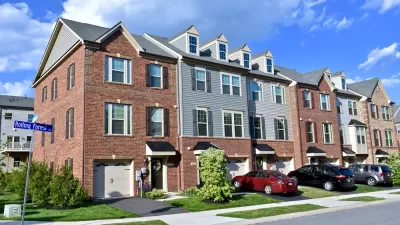How the journey of one zoning reform campaign can inform future efforts.

When Portland requested public comment on its residential infill project in early 2020, "the in-person public commentary came to 106 in favor of pro-housing reform and 30 opposed," signaling overwhelming support for a frequently controversial form of rezoning, writes Michael Andersen. Thanks to the work of a vast network of community activists, planners, developers, and city staff, the proposal gained the support needed to make Portland one of the nation's first big cities to begin reversing the status quo of single-family zoning.
"The result was an unprecedented reform, legalizing up to four homes by right on almost any residential lot," permitting three-story buildings, and eliminating residential parking requirements in an effort to create more affordable housing in the city. "Portland’s most optimistic projection of the short-term impact comes out to 1,200 net additional homes per year, enough to increase the city’s annual housing production by roughly 20 percent," which could amount to a 12 percent reduction in the median rent.
Andersen's article details the eight situations when the reform could have died. These include NIMBY resistance, a lack of representation in initial community input, displacement disputes, and other scenarios that typically doom such initiatives to failure. "Whatever may or may not get built, there is no question that this reform’s unlikely five-year journey to passage offers political lessons for similar cities pursuing zoning and policy changes."
FULL STORY: THE EIGHT DEATHS OF PORTLAND’S RESIDENTIAL INFILL PROJECT

Planetizen Federal Action Tracker
A weekly monitor of how Trump’s orders and actions are impacting planners and planning in America.

Maui's Vacation Rental Debate Turns Ugly
Verbal attacks, misinformation campaigns and fistfights plague a high-stakes debate to convert thousands of vacation rentals into long-term housing.

Restaurant Patios Were a Pandemic Win — Why Were They so Hard to Keep?
Social distancing requirements and changes in travel patterns prompted cities to pilot new uses for street and sidewalk space. Then it got complicated.

In California Battle of Housing vs. Environment, Housing Just Won
A new state law significantly limits the power of CEQA, an environmental review law that served as a powerful tool for blocking new development.

Boulder Eliminates Parking Minimums Citywide
Officials estimate the cost of building a single underground parking space at up to $100,000.

Orange County, Florida Adopts Largest US “Sprawl Repair” Code
The ‘Orange Code’ seeks to rectify decades of sprawl-inducing, car-oriented development.
Urban Design for Planners 1: Software Tools
This six-course series explores essential urban design concepts using open source software and equips planners with the tools they need to participate fully in the urban design process.
Planning for Universal Design
Learn the tools for implementing Universal Design in planning regulations.
Heyer Gruel & Associates PA
JM Goldson LLC
Custer County Colorado
City of Camden Redevelopment Agency
City of Astoria
Transportation Research & Education Center (TREC) at Portland State University
Jefferson Parish Government
Camden Redevelopment Agency
City of Claremont





























